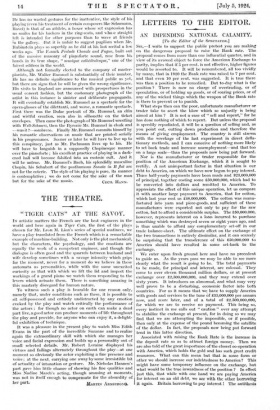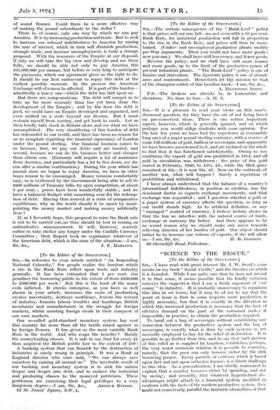LETTERS TO THE EDITOR.
AN IMPENDING NATIONAL CALAMITY.
[To the Editor of the SPECTATOR.] SIR,--I write to support the public protest you are making on the dangerous proposal to raise the Bank rate. The.
proposal comes from more than one influential quarter, and in view of its avowed object to force the American Exchange to parity, implies that if 5 per cent. is not effective, higher figures would be resorted to. It will be remembered, all too vividly by many, that in 1920 the Bank rate was raised to 7 per cent. and that even 10 per cent. was suggested. It is true there was then a position to be remedied. But to-day what is the position ? There is now no charge of overtrading, or of speculation, or of holding up goods, or of soaring prices, or of any of the wicked things which the weapon of the Bank rate is there to prevent or to punish.
What steps then can the poor, unfortunate manufacturer or trader take to avert the blow which so unjustly is being aimed at him ? It is not a case of " sell and repent," for he has done nothing of which to repent. But unless the proposal is speedily repudiated, it will be a question of selling and, as you point out, cutting down production and therefore the means of giving employment. The country is still strewn with the wreckage of the last experiment in direct defla- tionary methods, and I can conceive of nothing more likely to set back trade and increase unemployment—and that too on a large scale—than the proposals now being put forward.
Nor is the manufacturer or trader responsible for the position of the American Exchange, which it is sought to rectify. A not unimportant factor in that situation is our debt to America, on which we have now begun to pay interest. Three half-yearly payments have been made and $23,000,000 of principal, together costing some £50,000,000, which had to be converted into dollars and remitted to America. To appreciate the effect of this unique operation, let us compare it with another large payment to America, that for cotton, which last year cost us £48,000,000. The cotton was manu- factured into yarn and piece-goods, and sufficient of these manufactures were exported not only to pay for the raw cotton, but to afford a considerable surplus. The £50,000,000, however, represents interest on a loan incurred to purchase something which was destroyed seven or eight years ago, and is thus unable to afford any complementary set-off in our trade balance-sheet. The ultimate effect on the exchange of the two transactions is entirely dissimilar, and it can scarcely be surprising that the transference of this 250,000,000 to. America should have resulted in some set-back to the exchange.
We enter upon fresh ground here and have no precedent to guide us. As the years pass we may be able to see more clearly what the result is going to be. The total payments to be made, for principal and interest, are colossal. They come to over eleven thousand million dollars, or at present exchange over £2,500,000,000, and they may extend over sixty years. It introduces an abnormal, and what may very well prove to be a disturbing, economic factor into both countries. For us it means that we have to supply America with goods and services to the tune of £35,000,000 per annum now, and more later, and of a total of £2,500,000,000, for which we are to receive no payment. This being so, every instinct in me calls out " caution " over any attempt to stabilize the exchange at present, for in doing so we may find that we are attempting the impossible, or if possible, then only at the expense of the pound becoming the satellite of the dollar. In fact, the proposals now being put forward tend in this latter direction.
Associated with raising the Bank Rate is the increase in
the deposit rate so as to attract foreign money. Then we are also told of the great importance of the closest co-operation with America, which holds the gold and has such great credit resources. What can this mean but that in some form or other we should increase our indebtedness to America? This might have some temporary influence on the exchange, but what would be the true inwardness of the position ? In effect just this, that while with one hand we are paying America for interest on an old debt, we are with the other borrowing it again. Britain borrowing to pay interest ! The antithesis
of sound finance. Could there be a more effective way of making the pound subordinate to the dollar ?
There is, of course, only one way by which we can pay America. It is by increasing production andtrade. But to seek to increase our colossal indebtedness to America by raising the rate of interest, which in turn will diminish production, strangle trade, and increase unemployment, is truly a strange proposal. With the resources of the Empire at our disposal, if only we will take the big view and develop and use them fully, we should be able not only to pay America this 135,000000 per annum, but before so very long to anticipate the payments; which our agreement gives us the right to do. It should be our first endeavour to repay this debt at the earliest possible moment. In the process the American Exchange will of course be affected. It is part of the burden— admittedly a heavy one—which the debt has laid upon us.
But there are compensations. The debt will compel us to take up far more seriously than has yet been done the development of the Empire ; and by the time the debt is paid, we could• have an Empire developed and organized, and even unified on a scale beyond our dreams. But I must restrain myself from soaring, and get back to earth. Let us then briefly take stock in Britain alone and see what we have accomplished. The very shouldering of this burden of debt has redounded to our credit, and there has been no reason for us to complain regarding the financial supremacy of London under the pound sterling. Our financial business comes to us because, first, we pay our debts and are trusted, and second, because we can do the business better and cheaper than others can. (Germany will require a lot of assistance from America, and particularly has a lot to live down, ere she can offer a similar combination.) During the year which has passed since we began to repay America, we have in other ways reason to be encouraged. Money remains comfortably easy, as is evidenced by the Government being able to sell its £600 millions of Treasury bills, by open competition, at about 3 per cent. ; prices have been wonderfully stable ; and we have a balanced Budget with something over for the redemp- tion of debt. Having thus arrived at a state of comparative equilibrium, why in the world should it be upset by mani- pulating the money market and making money artificially dear ?
If, as I fervently hope, this proposal to raise the Bank rate is not to be carried out, no time should be lost in issuing an authoritative announcement. It will, however, scarcely suffice to take shelter any longer under the Cunliffe Currency Committee ; their Report took no cognizance whatever of the American debt, which is the crux of the situation.—I am,



















































 Previous page
Previous page